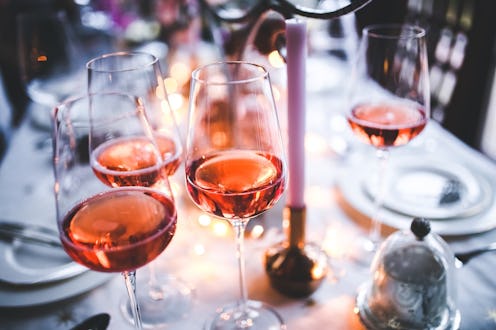Red, white, sparkling, rosé, vino-infused coffee? In a box, in a bottle, in a can, in a glass in your hand? Yes, please. It's no secret that the millennials and wine go together like peas and carrots, as Forrest Gump would say. In fact, you love wine so much that the millennial generation is actually changing the way wine is bought and sold.
A recent study from the wine industry nonprofit, Wine Market Council, says millennials drank 42 percent of all wine in the United States in 2015, more than any other age group — an average of three glasses per sitting to be exact. Additionally, overall, women consumed 57 percent of all wine in the U.S. during the same time period.
And, because necessity is the mother of invention, winemakers have had to change they way they sell wine, you know, because you're also the most tech-savvy generation, and the old ways of doing things don't always make sense to you. You want your wine, and you want it now. Business Insider reports that millennials' demand for on-demand wine has "led to the rise of wine delivery and check-in apps, as well as products that promote convenience, like wine sold in a can."
Additionally, Food & Beverage Magazine suggest that you, my fellow millennial wine drinker, have forced winemakers to meet you where you live, in the digital age.
You likely also care about what's in the things you put in your body more than previous generations, and this has led to a boost in the organic wine market, too. Infiniti Research reports that the organic wine market is expected to grow at a rate of almost 10 percent a year for the next five years.
"Organic wine is popular with this consumer group due to their overwhelming focus on healthy lifestyles and preference for organic, natural food and beverage products," Business Wire reports.
Personally, I love wine. A lot. It's pretty much my go to drink these days, and I actually don't even remember the last time I had a beer. An added bonus of drinking wine is the reported health benefits, which include living a longer life, reducing cancer risks, and improving cardiovascular health. And, aside from being a healthier choice, wine often comes with a narrative, and it makes you feel good, too. Life Hack reports that people who drink two to seven glasses of wine per week are less likely to be diagnosed with depression.
As you reach for wine as your go-to drink, winemakers are trying to hard to understand just what makes you tick, because it's not the same things that drew baby boomers to wine. For example, you might be precious a bout a lot of things, but wine is not one of them. Typically, you don't care how long your vino has aged, and you'll take a screw top bottle just as quickly as you'll take a cork. In fact, sometimes you prefer a screw top, or even a can. No biggie.
"I always feel that they [millennials] are thirsty for knowledge and very interested in the narratives behind the wines as much as the wines themselves," Winemaker Chaim Gur-Arieh, Ph.D. explains on his blog. "I was very surprised recently to find out that the consumption of beer by millennials has declined from 70 percent a few years ago to 40 percent in 2015 replacing the beer with wine and cocktails. In my opinion this is happening because beer has more functionality and wine is more emotionally fulfilling, a factor that the millennials are able to discern in shifting their preference."
Whatever your reason for reaching for wine, congrats on disrupting an industry that's been around since the dawn of time. They're changing the way they do things because you demanded it. Cheers!
